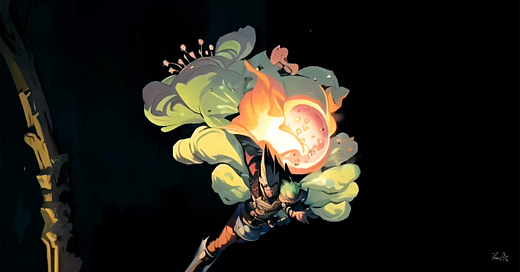Still from Let 1,000 Flowers Bloom (Mood), 2024-Ongoing
Watch the first few seed animations on my Instagram or on Karialtmann.com
With any tool or material there’s a sixth sense, a “knack” for how it handles and drives. I’ve been getting wet with different AI in painterly, video ways and I now have a feel for what certain ones will do with certain inputs…like they’ve become lenses in my arsenal. I like finding the forms that will ambiguate them or work with them in ways that push them beyond their tropes. And since these are generative, they are slightly unique every time they run.
Let 1,000 Flowers Bloom is a saying related to diversity—versions and cultures, taking a seed of something and letting it spread, propagate and even vary in 1,000 ways. It’s also a big schmood, you know? It’s a whole way of being…seeing…seeding…
I like to imagine these fields with 1000 fragrant blooms, or a tree with 1000 types of fruit…
Still from Let 1,000 Flowers Bloom (Mood), 2024-Ongoing
Watch the first few seed animations on my Instagram or on Karialtmann.com
Each one is unique and it can render again and again and again….fresh cuts each time from the same seed and always regenerating….flowerfuturebombs unfurling? It’s wild to imagine a field of blooms as a field of plumes. Sometimes history feels more like a field of fire than of ideas, depending on your angle. But maybe it’s really all the same.
The source of this phrase points in a few directions. Let A Hundred Flowers Blossom was also a governmental movement from Communist China in the 1950s that supposedly encouraged diversity of public speech and thought, even inviting open criticism of the government. It was suspected as a tool for catching dissidents, as many critics of Mao that spoke up in this time were executed. The opening of the new Netflix series, “3 Body Problem” shows some of this. Some believe that the government was only surprised and upset by how much negative feedback there was and behaved in a reactionary manner. Flowers are so often used as metaphors—for collective bodies, hearts and minds.
Since the late 20th and early 21st Century, “let a thousand flowers bloom” is quoted (misquoted?) more as a general “proverb” and idea related to encouraging variation and versions, not interfering when something new is forming, replicating, diversifying and differentiating, as well as scattering ideas etc. into nurseries far and wide with a sort of open-source ethos. It’s also related, at least in my own intercultural/transcultural mind, to the appreciation of many schools of thought or cultures of understandings, inviting them all into “the field”, or seeing this expansive, endless “field” in all its mutating multiplicity.
Sometimes, when used in terms of innovation, especially by tech and entrepreneur types, it’s encouraged to “Let 1000 Flowers Bloom” then “Rip out 999”, ie start generating ideas and iterations, then later get rid of the ones that aren’t “it”. The process of ideation can be good for your end results and for neuroplasticity. But what if we didn’t rip out all our iterations? What if we let all of them bloom in their own unique way, on their own unique timeline or in their own fascinating forms?
“The field” makes me think of the massively mistranslated Rumi poem about the “field of right and wrong”. The original poem, written in Persian as Rumi’s city was then a part of the Persian Khwarezmian Empire (sometimes debated), was much more Islam-centric as Rumi was a Muslim and later a Sufi mystic, despite him also claiming he was beyond religion (especially Zoroastrianism, Christianity or Islam). The watered-down and secularized translations by Coleman Barks have been floating around for too long…with many people completely missing the context of the source material…but strangely even the bonsai’ed mistranslations are some of the most viral blooms of language in the world. Rumi’s original “field” was actually a desert plain beyond the reaches of both Islam and disbelief.
“The field” also comes up a lot in my work as Hitashya, and sometimes in my project Garden Club.
In many parts of the world now is the time when things are blooming and when major “new beginnings” festivals are taking place. Happy Ramadan, Nowruz, Holi, Easter and all the rest.
You can read more about the original Rumi poetry via @rumiwasmuslim (a project by @persianpoetics)
#kaialtmann #karialtmann #ai #painting #video #let1000flowersbloom #aipainting #aivideo





